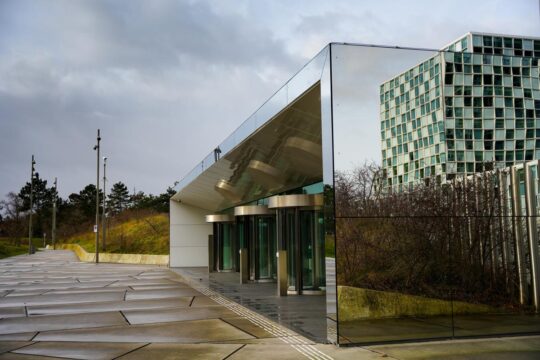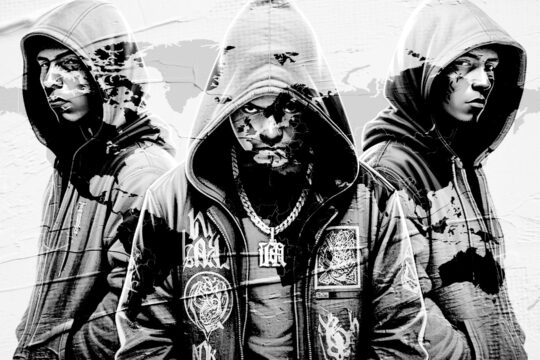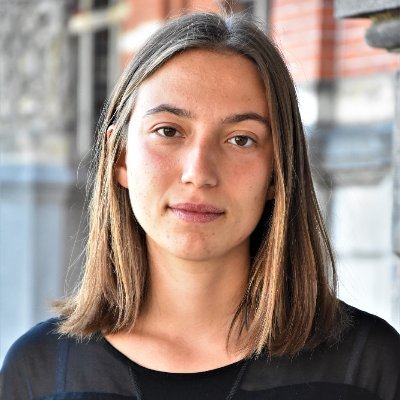On 11 April 2025, after four days of hearing, the three members of the disciplinary board of the International Criminal Court (ICC) entered the Press Briefing Room of The Hague court, arranged as a courtroom. Dressed in their lawyer’s black gowns, they sat at the higher table. In front of them, the commissioner and the defence sides, with Jennifer Naouri sitting next to her lawyer.
The board found the defence lawyer guilty of “inappropriate behaviour” and “damaging the reputation of the Court” in the period from 2018 to 2022, and decided to suspend her from practicing before the court for 18 months. This is the heaviest sanction ever pronounced for such a case. Since its first case in 2010, the board has adjudicated about a dozen cases: the minimum sentence has been an admonishment and the maximum sentence a three months’ suspension.
“The decision brings up a lot of emotions, we are still processing it,” says BL, one of the plaintiffs, who asked to remain anonymous. “We hope that the sanctions will be sufficient to prevent Naouri from reiterating similar acts as we are concerned for the people working for her.”
Naouri is presently the senior defence lawyer of Mahamat Said Abdel Kani, a Seleka commander from the Central African Republic, whose trial is the only ongoing trial before the ICC at the moment: its defence phase has just begun with so far only one hearing on 17 March 2025. Before this trial, she was one of the defence team of Laurent Gbagbo, the former president of the Ivory Coast who was acquitted by the ICC in 2019.
“Profond trauma”
The disciplinary committee says its decision was motivated by the “extreme gravity” of the acts committed by the counsel and the “profound trauma these have caused to the victims - some of whom continue to suffer to this day”. Naouri faced several charges, including moral harassment and abuse of authority, for which she was found guilty. She was also accused of fraud, for allegedly manipulating the timesheets, and breach of confidentiality, for which the board’s three lawyers decided she was not guilty.
“We are disappointed by the decision. We have the feeling that the Committee did not understand the reality of the situation that we tried to show,” says Naouri’s defence lawyer, Philippe-Henry Honegger. According to him, Emmanuel Altit, the lead defence counsel in the Gbagbo case, “is responsible from a factual and judicial point of view”.
Depending on the motivation given by the board in the next two weeks, we will decide whether to appeal the decision or not, says Honegger. He will have one month to do so.
A complaint by 14 people filed in 2023
The Disciplinary board has three members, two of whom are permanent and one ad hoc. The two permanent members are elected for four years by all counsels entitled to practise before the Court. The ad hoc member is appointed by the national authority competent to regulate and control the activities of counsel subject to the disciplinary procedure. Currently, these three members are Vincent Asselineau, Philippe Larochelle and Emmanuel Molina (ad hoc member). The board is responsible for deciding on the misconduct of all lawyers at the ICC – whether they are defence or victims’ lawyers – under the Code of Conduct for counsels.
The seeds for this case were planted in April 2022, when Naouri was invited to a War Crimes Conference of the International Bar Association to talk about a healthy workplace environment. Following the invitation, the organisers received a letter signed by the 14 plaintiffs in the current case, sharing their experience working for Naouri. These former case managers, assistants and trainees in the defence teams of the Gbagbo and Said cases got organised, and on 17 April 2023, they filed a complaint with the ICC Registrar. The matter was then brought before the commissioner, who is responsible for investigating such cases and bringing them before the disciplinary committee if there is enough evidence. Commissioner Catherine Mabille, with the help of lawyer Marc Desalliers who worked as the “prosecution” of this case and proceedings, sent her report in July 2024.
At the start of the proceedings, Mabille said this case is unique: “Such a case file has never been seen, for the number of victims and the length and importance of the evidence, we had 6,000 pages.” The initial complaint covered the period from 2012 to 2022. However, the board only has jurisdiction from August 1, 2018, when Naouri was promoted to defence counsel. Before then, she worked as a case manager and legal assistant. As a result, only 8 of the 14 victims – including 13 women and 1 man – were admissible in that time frame, while the others provided contextual elements.
“Psychologically mutilated” victims
As the public hearing unfolded from 7 to 11 April 2025, around 30 people filled the gallery daily, including the victims and their partners and other ICC lawyers who were aware of the situation. A suspended silence took over the room during the closing remarks on 10 April. Mabille spoke about excessive working hours, constant availability and little to no time off for an insufficient salary. The victims were “totally exhausted”, she said, as she detailed the micromanagement that Naouri put in place in the team. The victims, many of whom worked as case managers, were the ones to have access to the ICC incoming emails and were tasked with forwarding her all emails within 10 minutes, even on weekends. They also had to let Naouri verify all of their correspondence, except some IT emails.
“This made me most angry. Young women come to the ICC with great enthusiasm and dreams, and what happens? They are psychologically mutilated, harassed, they are told that they cannot understand the dossier and cannot analyse all the dangers, so they can only obey,” Mabille said. According to the Commissioner, despite Altit being the lead counsel in the Gbagbo case, it was Naouri who assigned the tasks.
“The modus operandi was terrifying”
Mabille went on talking about Naouri’s manipulation, humiliation, and denigration of the victims, and the frequent shouting episodes, at the ICC and over the phone: “There was a catastrophic climate in the team because they were constantly vigilant for the next crisis.” She sometimes shared inappropriate personal information with them and often made comparisons, valorised some and criticised others, argued Mabille. “The modus operandi was terrifying.” Mabille added that four plaintiffs said this behaviour during the Gbagbo case also happened in the Said Abdel Kani case. “The victims told me that they are doing this not to take revenge but because they don’t want other victims to experience the same thing.”
Naouri first learnt about the complaint in 2022, commented Mabille, and yet in 2024 and 2025, two more people working on the Said case took leave because of her management.
Naouri and Altit: “She was his slave”
According to Naouri’s defence lawyer, the “real responsibility” lies with Altit, who put the system of micromanagement in place. She was “in the grip of Altit”, who controlled her 8 hours per day on Skype and called her during holidays and even funerals, Honegger said. As Naouri started crying, and Honegger went on, saying that “she was his slave. The slave is not responsible, the owner is responsible.” He added that Naouri suffered from post-traumatic stress, so she was in an altered mental state.
Honegger continued by arguing that the evidence brought only covered a few months or years and did not constitute harassment. He said that the Gbagbo and Said teams were not “comparable”. While in the first one, there were “structural problems” for which Altit should be held responsible, in the second one, the conditions are good. During his statement, he blamed the “unbearable” working conditions at the ICC - where there is a very limited budget to deal with the “most traumatic cases of humanity” -, for the burnouts.
“I lived in constant fear”
Six of the plaintiffs, all women, testified on 7 April 2025. All said they had almost no contact with Altit, and that all communications with him had to be first authorised by Naouri and then reported to her. They said they were isolated, as all relations with other people inside and outside the court were discouraged and scrutinised. PL, one of the victims, talked about Naouri’s screaming episodes: “I lived in constant fear of crises; they were impossible to predict because they could be caused by anything”, she said in tears.
Another victim, EC, said all the case managers were scolded via email because one of them wrote “il” (the French word for “he”) instead of “elle” (“she”) in a document. She was told that nobody could make decisions apart from Naouri and Altit and that the integrity of the case could suffer. “Being constantly questioned prevents us from thinking and working and is humiliating and very degrading,” she said. EC was 26 at the time she worked on the Gbagbo case. She recalled a 2019 episode involving the filing of defence submissions that led to her resignation. After what she saw as a mistake, Naouri called her. She asked EC repeatedly, “Who are you? Who are you?” until she finally replied, “I am nobody”. EC pauses, shaken by sobs, her hands gripping the arms of the chair tightly.
Working under Naouri had a long-term impact on their self-confidence and psychological health, said most of the victims. Some went to therapy and were diagnosed with post-traumatic stress, depression and burnout. PL recounts being constantly “exhausted”. “I had lost all control of myself and no longer recognised myself, I could not imagine a future,” she said in tears. Some victims decided to leave the international criminal law field. They also testified that they had lost all sense of normality in the workplace.
“The hardest part is that we were set for failure all the time. You were given contradictory instructions; if you asked for information, you were yelled at, if you didn’t, you were yelled at. There was just no way out,” says PL to Justice Info. EC recounts often working until 3 or 4 am: “We would leave the Court sometimes when the sun was rising”, and they were back in the office at 9 am. Both victims explain that they had to abide by precise rules: have their hair up and wear no lipstick or earrings in Court. “After leaving, I apologised to my following counsel because I couldn’t find something to tie my hair and he said so?”, says PL.
A second board witness, a jurist who was part of the Said team until she went on medical leave in the summer of 2024, could not come in person. Her doctors said that she was not fit to testify about her former working conditions.
On 8 and 9 April 2025, seven defence witnesses were heard, who testified about Altit’s treatment of Naouri. Altit himself, who is not called to account by the disciplinary board, was then called to testify as a disciplinary board witness to determine what was her room for manoeuvre as part of the team. Justice Info was not present to attend these hearings.
“I was a prisoner”
On 10 April 2025, it was Naouri’s turn to testify. The seasoned laywer and former president of the International Criminal Court Bar Association (ICCBA) sat on the table facing the board. “Why does the defence focus primarily on Altit when the subject of this case is your behaviour towards the witnesses?” asked the Commissioner. Naouri replied that her behaviour was the result of his harassment. “I was a prisoner”, she said, crying and holding her head in her hands. “You ask me why this is my defence? It’s the only defence I have, it’s my reality.”
Mabille then referred to part of Naouri’s written statement, “I am the main victim of this toxic management and despite myself, I am the executor”, and asked whether she still considers herself the main victim. Voice broken by sobs, she said that in the Gbagbo team it was “horrible for them [the victims] but for me too”. After a short break in the proceedings to allow Naouri to calm down, Mabille asked her whether she recognised the victims’ suffering in both trial teams. “I’ve never denied it”, said Naouri, and added that while in the Gbagbo case, the problems were structural, in the Said one, she recognised their suffering but not the harassment. She added that she has started therapy.
Different proceedings
The disciplinary committee issued several recommendations to Naouri. She is asked to make “every effort to adopt alternative management methods”, to receive psychological support and undergo “in-depth training in professional management methods”. She was also sanctioned to pay for the proceedings, together with the ICC. “This is based on evidence in the case file that demonstrates the court’s registry and CSS’s [the Counsel Support Section] knowledge of the accusations against Ms. Naouri.”
One of the victims who worked in the Said team in 2021, VA, testified that at the time of the facts, she went to speak to the Counsel Support Section (CSS), which took no action and discouraged her from bringing the case forward. “The support staff was left in a highly vulnerable position”, says PL to Justice Info. External staff at the ICC are not protected under the same regulation as the internal one. She explains that initially, Naouri was also part of the International Criminal Court Bar Association (ICCBA), so they did not feel like they could go to them. The board also gave several recommendations to the court’s services, asking counsels to “undergo mandatory and recurring ethics training to avoid any deviant behaviour” and the Registry and the CSS to report possible violations.
Only in 2022, after years of petitioning by senior defence lawyers, were the Registry’s administrative instructions updated to address moral and sexual harassment and abuse of authority for counsels.
“This was a very painful process”, says PL to Justice Info. It was stressful to go and tell our story, but it was also painful and a bit humiliating to hear the defence line. Jennifer never apologised for what she did.”








